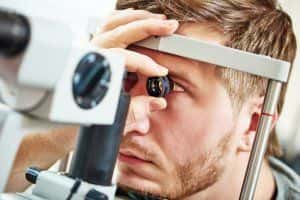Treatment for glaucoma often begins with medicated eye drops. The goal of these medications is to lower the pressure in the eye (intraocular pressure) and prevent damage to the optic nerve. To gain the most benefits of these medications, use them exactly as prescribed by your eye doctor. Sometimes your
Read moreGlaucoma

Glaucoma is an eye condition that is often characterized by an abnormally high intraocular pressure (i.e., pressure in the eye), which can ultimately damage the optic nerve. The added intraocular pressure is the result of fluid accumulation in the eye. If left untreated, it can result in complete vision loss.
Glaucoma may not produce any noticeable changes in your vision until the disease is more advanced. That’s why having regular eye exams starting at age 40 — or earlier for certain ethnic groups — is an important part of preventing loss of vision from glaucoma.
Currently, there is no cure for glaucoma. In addition, any damage to the optic nerve cannot be reversed. Once glaucoma has been diagnosed, though, several treatments including medicated eye drops and surgery are available. Treatments may slow the damage and prevent further loss of vision.
The surgical procedures performed to treat glaucoma include:
- Laser surgery (laser trabeculoplasty). This approach is performed to open drainage canals in the eye that are clogged.
- Filtering surgery (trabeculectomy). With this surgical technique, a small piece of tissue is removed to allow fluid to drain properly from the eye.
- Placement of a drainage implant, such as iStent. With this treatment option, your ophthalmologist inserts a small tube into the eye that allows excess fluid to drain.
If you notice any changes in your vision, contact us for an appointment, so we can diagnose your vision problem and provide suitable treatment options. If your vision suddenly becomes blurry and is accompanied by severe eye pain, nausea, headache, reddening of the eye or halos, contact your eye doctor or go to the emergency room immediately, as this may be a sign of vision-threatening acute angle-closer glaucoma.
-
Medicated Eye DropsCategory: We Can Help With, Glaucoma
-
What is GlaucomaCategory: We Can Help With, Glaucoma
Glaucoma is a condition characterized by excessive pressure in the eye, or intraocular pressure. This irregularly high pressure is due to a buildup of fluid in the eye. As intraocular pressure increases, it can compress the eye’s optic nerve, eventually leading to vision loss. Around 3 million people
Read more -
iStentCategory: We Can Help With, Glaucoma
The iStent Trabecular Micro-Bypass is a surgical device that is available for use in treating patients with mild-to-moderate open-angle glaucoma. Glaucoma is characterized by an excessive accumulation of fluid inside the eye, which leads to an increase in the inner eye pressure (intraocular pressure).
Read more
Our Location
#105 - 13737 96 Avenue,
Surrey, BC V3V-0C6
We look forward to hearing from you.
Monday
9am - 5pm
Tuesday
9am - 5pm
Wednesday
9am - 5pm
Thursday
9am - 5pm
Friday
9am - 5pm
Saturday
Closed
Sunday
Closed
#105 - 13737 96 Avenue Surrey, BC V3V-0C6
